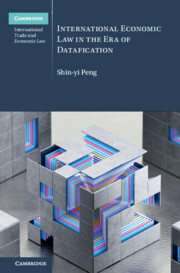Book contents
- International Economic Law in the Era of Datafication
- Cambridge International Trade And Economic Law
- International Economic Law in the Era of Datafication
- Copyright page
- Dedication
- Contents
- Acknowledgments
- Introduction
- Part I Enabling Datafication
- Part II Driving Datafication
- 3 Data-Driven Platform as Service
- 4 Data as Speech and Expression
- 5 Data as Capital and Algorithmic Input
- Part III Datafication and Data Flows
- Select Bibliography
- Index
4 - Data as Speech and Expression
Trade Aspects of Media Content Regulation
from Part II - Driving Datafication
Published online by Cambridge University Press: 28 March 2024
- International Economic Law in the Era of Datafication
- Cambridge International Trade And Economic Law
- International Economic Law in the Era of Datafication
- Copyright page
- Dedication
- Contents
- Acknowledgments
- Introduction
- Part I Enabling Datafication
- Part II Driving Datafication
- 3 Data-Driven Platform as Service
- 4 Data as Speech and Expression
- 5 Data as Capital and Algorithmic Input
- Part III Datafication and Data Flows
- Select Bibliography
- Index
Summary
Media platformization has caused problems that a state cannot easily regulate. The media content regulations considered in Chapter 4 are prime examples demonstrating the need to alter the power distribution in the Internet ecosystem. In terms of speech platforms, the “rules-based” platform governance model led by the EU, such as the DSA, now represents a strong power in balancing the US’ CDA-based social media self-regulation. The years to come will be critical to the global governance of digital platforms. Key indicators include whether more and more countries will adopt DSA-like regulations along the EU regulatory path. In terms of streaming services, the content quotas for video streaming platforms may constitute performance requirements for investment in services. This measure may also violate the obligations that apply to the nondiscriminatory treatment of digital products. Looking ahead, cultural diversity concerns regarding avatars in the VR space will be even more complex and will propel the “trade v. culture” clash to another level. No matter how carefully crafted, media content regulation must face enforceable reality. Trade rules that ban local presence would enable platform companies to supply services without establishing a local presence, which could significantly constrain a state’s ability to enforce platform regulations.
Keywords
- Type
- Chapter
- Information
- International Economic Law in the Era of Datafication , pp. 108 - 142Publisher: Cambridge University PressPrint publication year: 2024

